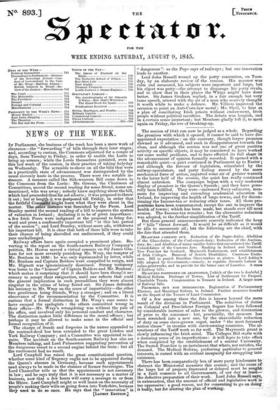NEWS OF THE WEEK.
IN Parliament, the business of the week has been a mere work of clearance—the " forwarding " of bills through their later stages; and, according to custom, the Commons adjourned for a couple of days, from Tuesday to Friday, in order to enable the Lords to bring up arrears ; while the Lords themselves persisted, even in this last week of the session, in their practice of taking holyday on Wednesday. The scramble to shove on all the bills that were in a practicable state of advancement was distinguished by the usual slovenly haste in the process. There were two notable in- Stances. A measure called the Silk-weavers Bill came down to the Commons from the Lords : Mr. Greene, the Chairman of Committees, moved the second reading for some friend, name un- Mentioned, who was away; nobody knew anything about the bill, which had proceeded thus far sub sikntio ; it was proposed to throw it out ; but at len • it was postponed till Friday, in order that the faithful C "firiiiight learn what they were about in the 333atter. The other instance was furnished by the Peers. Lord Stanley mo'ved the second reading of a bill to improve the system of valuation in Ireland ; declaring it to be of great importance : a few Irish Peers were indignant at the proposal to bring for- ward and press a confessedly important bill "at this late period of the session"; and Lord Stanley, without more ado, withdraws his important bill. It is clear that both of these bills were to take their chance of being shovelled out undiscussed, if they could pass unchallenged. Railway affairs have again occupied a prominent place. Re- verting to the report on the South-eastern Railway Company's petition, Mr. Hawes moved a virtual censure on Sir James Gra- ham for not more severely punishing Mr. Wray, the tempter of Mr. Bonham in 1836: he was only reprimanded by letter, while Mr. Bonham and Captain Boldero were compelled to resign, and Mr. Hignett was ignominiously dismissed. Strong testimony 'was borne to the "honour" of Captain Boldero and Mr. Bonham ; which makes it surprising that it should have been thought ne- cessary to accept their resignation, until one reflects that amid the general implication in such peccadilloes they were almost singular in the crime of being found out. Sir James defended his leniency to Mr. Wray on the score of impartiality—the other two gentlemen being friends Wray a stranger ; and on a literal observance of the recommendation by the Committee. It is curious that a formal distinction in Mr. Wray's case seems to have escaped the apologists : the others committed wrong in their offices—Mr. Wray's wrongdoing was without the pale of his office, and involved only his personal conduct and character. The distinction makes little difference in the moral offence ; but perhaps it may be allowed to make some in the official and formal recognition of it.
The charge of frauds and forgeries in the names appended to the contract-deed has been extended to the great London and York Railway Company ; and a Committee was appointed to in- quire. The accident on the South-eastern Railway has also set Members talking, and Lord Palmerston suggesting prevention of the dangerous resort to a second engine behind the train : but all the excitement had no result.
Lord Campbell has raised the great constitutional question, whether some kind of Regency ought not to be appointed during the Queen's absence in Germany, because such appointments used always to be made in the absence of former Sovereigns. The Lord Chancellor tells us that the appointment is not necessary in law; and he says truly that it is not necessary as a matter of business, now that a few hours will carry a message to or from the Rhine. Lord Campbell might as well insist on the necessity of people's making their wills on going down into Yorkshire, because they used te clo so once. He says that the "innovation" is "dangerous ": so the Pope says of railways ; but one innovation leads to another.
Lord John Russell wound up the party contention, on Tues- day, by an elaborate review of the session. His manner was calm and measured, his subjects were important and large, but his object was petty—the attempt to disparage his party rivals, and to show that in their places the Whigs might have done better. Sir James Graham replied, in a fair enough but very tame speech, uttered with the air of a man who scarcely thought it worth while to make a defence. Mr. Villiers improved the occasion to point an Anti-Corn-law moral ; Mr. Shell, to hint at a plan of conciliatino. Irish priests without endowment, Irish people without political sacrifices. The debate was longish, and in a certain sense important; but Members gladly left it, to meet again on Friday, the eve of breaking-up.


























